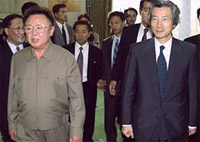 With the entire international community looking on, leaders of the Democratic People's Republic of Korea (DPRK) and Japan have seized the moment to make a major breakthrough in solving thorny issues standing in the way of normalizing bilateral relations.
With the entire international community looking on, leaders of the Democratic People's Republic of Korea (DPRK) and Japan have seized the moment to make a major breakthrough in solving thorny issues standing in the way of normalizing bilateral relations.
In a landmark summit meeting in Pyongyang on Tuesday, DPRK leader Kim Jong-il and Japanese Prime Minister Junichiro Koizumi agreed to restart negotiations on the normalization of ties in October.
A rapprochement between the two long-term rivals will certainly contribute to peace, stability and development in East Asia. That is why China, as a close neighbor and friend of both countries, has always welcomed efforts to forge closer ties between the two.
In the Pyongyang Declaration signed between the two leaders at the end of their summit, Japan apologized for its colonial rule over DPRK between 1910 and 1945. It also promised economic co-operation in such forms as grants and low-interest loans to the DPRK.
In return, Kim confirmed the whereabouts of 11 missing Japanese who were allegedly abducted in the 1970s and 1980s by DPRK agents.
An apology from Japan and its willingness to pay compensation and the acknowledgement of the abductions were the preconditions each had set before progress could be made to thaw decades of enmity.
It seems the summit meeting has been sufficiently fruitful to satisfy both sides in this regard. And it is commendable that the two leaders have demonstrated publicly that they are prepared to walk out of the shadow of their past skirmishes.
Nonetheless, the road ahead will be bumpy if words are not translated into action.
To prove that its apology to the DPRK is sincere and real, Japan needs to seriously learn lessons from history and act as a responsible and peace-loving country to win the trust of its neighbors.
As for the DPRK, it certainly has shown its ability in foreign diplomacy. It is noteworthy that the country has been engaged in a series of diplomatic overtures to improve ties with the outside world. It is believed that this will be conducive to the cultivation of a more favorable environment for the country's domestic construction and regional peace and stability.
The commitment made by the two sides to promote dialogue on resolving all security matters including nuclear and missile issues on the Korean Peninsula will also contribute to peace and stability on the Korean Peninsula as well.
'Ice-breaking' Tour
For the two countries yet with no formal diplomatic relations, the visit has at its behind special historical backgrounds and reality considerations.
First is positive attitude from the side of DPRK. Since July DPRK showed signs of economic reforms and at the same time speeded up diplomatic activities. Its reconciliation with ROK, touch with the US and visit to Russia were all regarded as successes. While ROK's clear attitude toward DPRK-Japan ties normalization also cast positive impact on Japan.
Second, Kim Jong Il's Russia visit also stirred Japan up. The DPRK leader talked much with Putin on pushing forward economic cooperation between the two countries, especially in the far-east region of Russia, with railway linking two Koreas and Siberian railway being the most important projects. Russia obviously showed strong interests in northeast Asia economic cooperation and hoped to join in its construction.
For Japan, this is a piece of news both good and bad. For northeast Asia economic circle is in line with Japan's wish and interests, but it wants to lead the construction by itself rather than other countries. This also prompted Japan to speed up cooperation with DPRK and show an active attitude towards the northeast Asia construction. In fact, Koizumi has put economic cooperation at the first place of his visit, hoping to solve problems through the way of "economic cooperation".
The US's attitude is also quite important. Although the Japanese PM's visit to DPRK, a country labeled as the "Axis of Evil" by George. W. Bush, seems not so conformed with the US, this is done under US tacit consent, otherwise Japan may not have gone so far.
More important is this is also in line with US interests. To guarantee stability in the Asia-pacific region, especially the northeast Asia is a question concerning the "national security" of the US. What's more, the US doesn't expect any crisis in Asia when making preparation to strike Iraq. And the US brain tanks also suggested the government to conduct talks with DPRK and loose its policy.
As a result the Japanese PM made a brave step, which is also an effort to step out from its own political dilemma. Under unfavorable domestic political and economic situations Koizumi's visit may win some support for him. Especially, his idea of replacing confrontations with dialogues has been widely accepted, which marked a rare progress made by the Japanese government on question of Korean Peninsula. Meanwhile, Japan's gesture to reconcile with DPRK was also welcomed by Northeast Asian countries; this can also be viewed as a diplomatic gains by Koizumi.
(Edited by Zheng Guihong for china.org.cn September 19, 2002)
|

